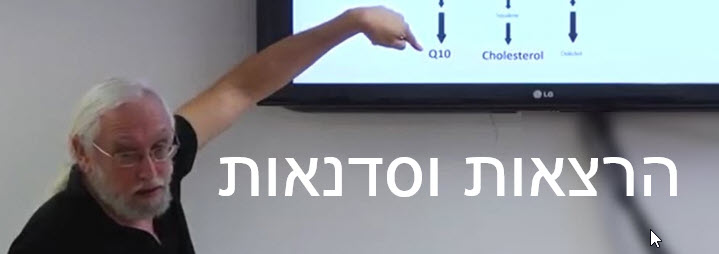
PSYCHIATRIC DRUGS: THE HEAVEN-HELL BALANCE
by Dolev Reuven Gilmore, PhD
Strange that I was not told
That the brain can hold
In a tiny ivory cell
God's heaven and hell.
-Oscar Wilde 1854-1900
They're not side-effects. And they're not rare. They are the direct actions of the drugs, appearing differently in each individual, as do the hoped-for benefits. The heaven and the hell.
I must admit that I'm not asked to treat the people who are helped by psychiatric drugs; I see the ones who need a different kind of help. The drugs didn't help them to get out of the hell in their minds, but only made it worse. In some cases, they were just going through a normally difficult time – before the drugs created the hell.
Lives are being destroyed. These patients may be schizophrenic and still hear voices; but now they walk like they have Parkinson's at age 20, with drool on their chins. Some may be in the hospital with priapism, a permanent erection which has no connection to sex. Etc…etc…etc… They may have been misdiagnosed, losing the best years of their lives to the iatrogenic (that's a nice way of saying "doctors caused it") symptoms of legal uppers and downers and stabilizers and stimulators and and and.
I guess a few case descriptions will say the most. Ready?
1. Now 42 years old, R finished the army as a Staff Sergeant, then completed studies at the top of his class in electronics and computer engineering. He was an excellent swimmer, and I was spellbound hearing him play the piano. The death of his grandfather in strange circumstances stressed him to the point that he went to a psychologist, who referred him to a psychiatrist, who put him on Clonex, the popular benzodiazepine for anxiety. When his problems worsened, he was given Modal (sulpiride), an antipsychotic of the "typical" phenothiazine family. He had no psychosis, but phenothiazines are "tranquilizing drugs with antipsychotic effects".
The psychiatrist forgot to tell him that Clonex is for short-term use only, and that it's very addictive. That was 13 years ago. His original dose of Clonex was one milligram. Do you know how powerful Clonex is? One milligram can be placed 4000 times in a teaspoon! Yet withdrawal from Clonex must be done over a period of several months, and many people just don't succeed in weaning themselves off. When R began to develop obsessions and compulsions along with his agitation, he went to a psychiatrist. This clever man figured the drugs weren't doing enough, so he doubled the dosage of Modal and quadrupled the dose of Clonex to 4 milligrams a day. I've seen a couple dozen people on Clonex, and no one was taking more than two milligrams. All of them are, or were, addicted.
R is presently begging for help to withdraw from the drugs, having failed several times because of severe withdrawal symptoms. He may be sitting on the beach, peacefully watching the sea, when he becomes filled with agitation and his heart begins to pound. He has many obsessions, talks in a loud voice, repeats things over and over and is driven to compulsive behavior. When I get a compulsion, such as waking up in the middle of the night and writing an essay – after I'm finished, I'm finished. I may go back and edit it a few times, but then I'm done. There's sort of a shut-off valve that closes after we've done something. People with obsessions and compulsions don't have this valve. Even after they've done something their minds tell them to do, they still feel the need to do it again. R lives upstairs from his mother. If he writes a note to her, he runs downstairs a dozen times or more to fix a sentence or reread it. He detailed several other obsessions. He's very intelligent and knows he is behaving irrationally, but can't help it. I won't even describe what it's like carrying on a conversation with him.
Notice I never said OCD? That's Obsessive-Compulsive Disorder, as you know. Clearly, that's the diagnosis that R's behavior points to, but that's not the diagnosis I would give him if I were a doctor who is allowed to diagnose. I would give him the diagnosis of DIOCTBABSA, which I just invented. That would be "Drug Induced Obsessive-Compulsive Behavior Accompanied by Severe Agitation".
Agitation? Isn't helping agitation part of Clonex's job description? Of course we can't blame Clonex for his situation. Maybe it's also Modal, the tranquilizer.
R has only just started nutritional therapy, beginning with three supplements, so there's nothing to report at this time.
2. At age five, B was taken from her parents, having suffered physical and emotional abuse. She was then adopted. At age ten, she had a hard time in school, being agitated and angry. She was prescribed the "mood-stabilizer", Tegretol (carbamazepine), which destabilized her mood even more, so at age 11 she was diagnosed as schizophrenic and given Risperdal. Since this caused her to gain 50% of her body weight in less than a year, she was given a different drug. Since that one caused whatever, she was given another one, going through a dozen drugs in different combinations over the next nine years. B was labeled as having low intelligence, although when she was taken off drugs a couple of times, she excelled in her studies.
When B was 19, a psychiatrist finally stated that she was never schizophrenic. She is still on drugs, however, and in and out of institutions. B needed, and needs, wisdom and emotional support as well as some vitamins, not drugs. In addition to the physical and emotional abuse of her early life, she has endured chemical abuse for the last eight years. Her parents are giving her the recommended vitamins whenever they can, and want to wean her from the drugs. However, the vitamins have been taken away from her at the educational institution where she resides most of the time. In the past, her psychiatrists have threatened forced hospitalization if her parents try to stop giving her the drugs.
Finally, a month ago, the psychiatrists agreed to let B's parents stop her two current drugs (Risperdal and promethazine, an antihistamine), but told them they must do so in two days! This should never be done so quickly. Nerve cells change in response to drugs, withdrawing or increasing the number neurotransmitter receptors on the membranes in opposition to a drug's effects. It takes time to readjust, and the result of quick withdrawal is a violent opposite reaction. Although B went through severe agitation and bursts of anger while at home, her parents have managed to keep her off the drugs. They told me the vitamins and minerals are helping. When they ran out of niacinamide (B3), she got worse, and then improved when put back on the vitamin.
Now 20 years old, B will still have to deal with the underlying emotional problems rooted in her difficult childhood, but, hopefully, without the added burden of drug hell.
3. Y was diagnosed – apparently correctly – as schizophrenic at age 19, six months before I first saw him. His parents invited me to their home, because he was in no condition to go anywhere. Y looked like a heroin addict with Parkinson's Disease. He could hardly walk or talk. The first thing I did was give him a shiatsu treatment. He was stiff as a board. He had been put on Haldol, two benzodiazepines and an antihistamine. All these drugs had no effect on the primary expression of his schizophrenia – voices that he heard day and night. They were coming from one of the apartments over there, and he wanted me to get the police to do something about it.
I have no problem that he was medicated. But when it didn't work, and only made him more agitated, other drugs were added. Psychiatry failed, increasing his hell, rather than alleviating it. Y's parents have taken things into their own hands. They are giving him all the recommended supplements, and are slowly weaning him off the drugs. He also had a series of shiatsu treatments, which calmed him and became the focal point of his week. Two months after beginning nutritional therapy and shiatsu, Y played basketball with his friends for the first time since his original psychotic episode. He is on a much lower dose of Haldol and a low dose of one benzodiazepine. He looks much better and can carry on an intelligent, although short, conversation. He wants to begin his studies again, is becoming more social and goes to the mall by himself. He still hears the voices and thinks they are real, but they talk softer and bother him less.
Well, that's enough stories for now. Psychiatric drugs are horrible. I'm not saying they don't benefit some people, but at what price? Do they add heaven or hell in the overall balance? Would the world be better off without them?
I can't judge the overall balance, which differs from drug to drug. Certainly, I would classify benzodiazepines as drugs which cause more hell. They are not worth the side effects and addictive potential and should be taken off the market, or, at most, given rarely for extreme anxiety states. I'm shocked at how many people are addicted to these things. How many little bits of heaven people got from benzodiazepines would you need to place on the scale to balance the destruction of R's life, and the lives of those around him?
The efficacy of antidepressants is doubtful. Any advantage over placebos is minimal and is probably an enhanced placebo effect, which I've explained elsewhere*. They also have rare side effects, like suicide and, possibly, mass murder. Anyway, serotonin levels can be raised just as effectively using the simple nutritional supplements which are precursors of serotonin. Clinical trials show that they are just as effective, with fewer side effects. The same can be said about the herb, St. John's Wort (hypericum).
Antipsychotic drugs have a split personality (no pun intended); however, if the heaven and hell added to human lives were placed on God's scale, my bet would be that hell is heavier. They may be helpful in the short term, but research shows that in the long term they may be worse for most people than no treatment at all. I'll cover that in a later article.
If a vitamin caused even one of the hundreds of side effects caused by psychiatric drugs, it would be off the market in a heartbeat. Would you say, "Double standard"? For the last 70 years, vitamins, minerals, amino acids and other substances natural to the human body have been used successfully to provide real help for psychiatric patients, with or without the co-administration of psychiatric drugs. This fact will not go away, no matter how long the medical world ignores or denies it, or whether or not you believe it. This is a fact. Proven. Witnessed in countless clinical cases and demonstrated in many trials. I've seen enough in my own small practice to convince me, even if I had never read about the experience of others.
This system of thought and practice is called "Orthomolecular", a term coined by the "Einstein of chemistry", Dr. Linus Pauling. People feel better and side effects are avoided or reduced. Tardive dyskinesia – a common "disease" caused only by psychiatric drugs – does not appear when orthomolecular therapy accompanies the drugs. It is nothing less than criminal negligence that this fact is ignored. Even more, orthomolecular therapy may be going beyond symptomatic treatment to the roots of these diseases. Thousands of schizophrenics and other sick people have recovered on this therapy – sometimes inaccurately called "megadose treatment" – and some of them have gone on to be psychiatrists and doctors. Ask psychiatrists how many of their patients have recovered their lives.
No one dies from taking vitamins or other nutritional supplements. Negative side effects are rare. Guidance by an orthomolecular practitioner improves the odds even more. The heaven of orthomolecular treatment outweighs the hell by millions to one.
Please contact me for information and to arrange a consultation about natural treatment for psychiatric disorders.







